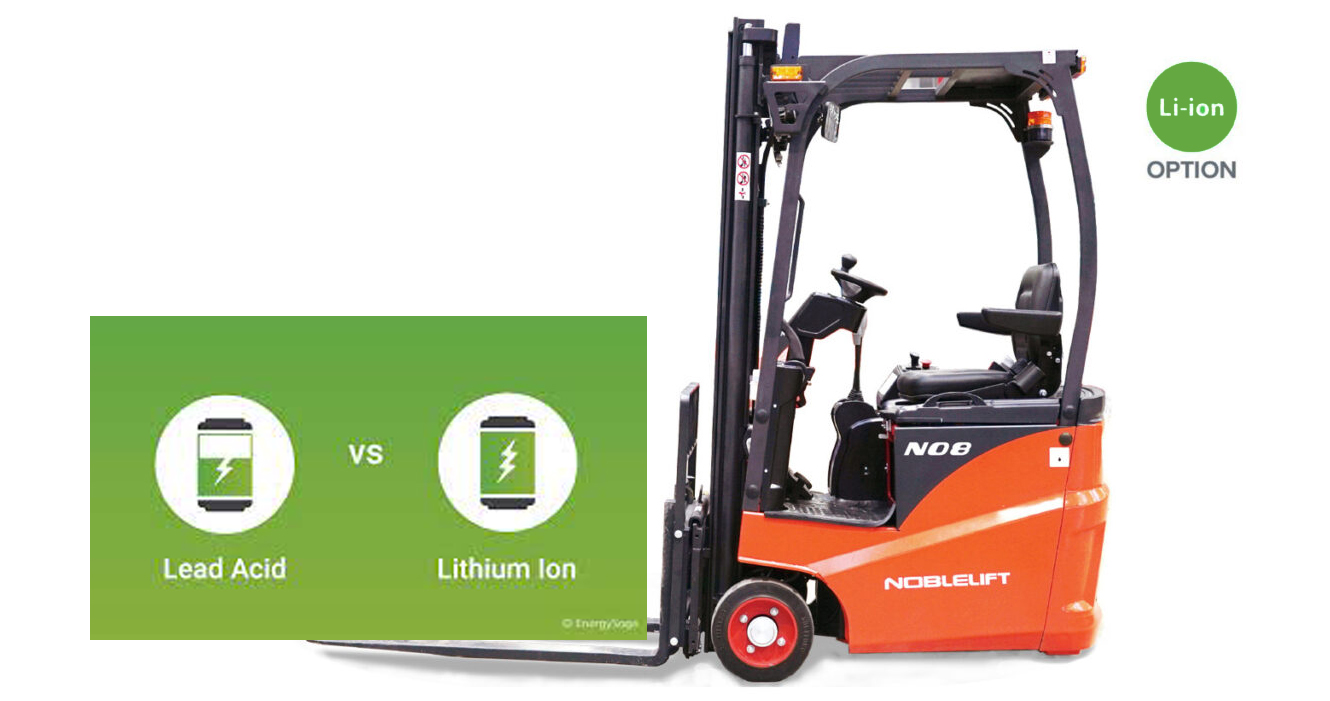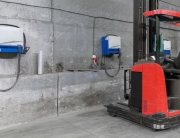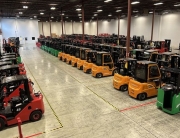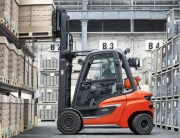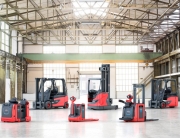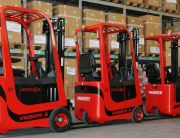Lift Trucks have come a long way since their invention in the early 1900’s and so have the options for powering these machines as there are different types of forklift batteries. Lift Trucks started with Diesel and Gasoline engines but quickly evolved into more efficient and cleaner forms of fuel such as propane (LPG), natural gas and of course electric power via rechargeable Lead Acid Batteries. Not only were these “cleaner” fuel sources more favourable when working indoors but they also saved companies money and are better for the environment. Today more than 75% of all material handling equipment sold is powered by an Electric Fuel system and powered by some sort of rechargeable battery.
Battery technology has also improved over time. The most common battery type used in materials handling today is still the lead acid rechargeable battery. This battery is virtually 100% recyclable and is relatively cost effective for most applications however it does require weekly watering and some maintenance to ensure long life. Lead Acid batteries are also limited in run time and by how fast they can be recharged safely. Up to 2 shifts per day, 6 days per week usage is generally the most you can expect from a Lead Acid battery with an Opportunity Charger and an efficient lift truck. Some applications need more run time than this and don’t want to change batteries due to the cost and safety concerns surrounding battery changes. This is where Maintenance Reduced battery technology and Lithium Ion options entered the market.
Lithium-ion vs lead-acid forklift battery
For a time the market looked to GEL batteries which required no maintenance but often these batteries were much more expensive than traditional lead acid batteries and did not last as long. GEL batteries were also limited in terms of how fast they could be recharged safely. Another battery type that was considered was Lithium Ion technology. Lithium Ion checked all the boxes – it was maintenance free, it lasted a very long time and could be charged at VERY high charge rates allowing the lift trucks to work more per day. The only problem with Lithium Ion was the cost associated with it – these batteries were very expensive – but the cost is lowering every year as the technology becomes more and more popular in cell phones, laptops, hand tools, lawn mowers and even cars.
The cost / benefit analysis for heavy use customers is starting to work for Lithium Ion batteries and chargers more and more. Customer acceptance of this new technology is increasing as virtually every Automobile Manufacturer is now offering an electric alternative, and the cost is coming down each year which also helps. Currently Lead Acid Batteries still dominate the electric forklift market with approx 75% of all electric forklifts using Lead Acid batteries. 15-20% use Lithium Ion and 5-10% other types (GEL or AGM etc). The Global Lithium-Ion Battery market is expected to reach $121.77 billion by 2026 rising by a compound annual growth rate of 4.6%. It is clear now that Lithium-Ion batteries are here to stay. They may not overtake the tried and true Lead Acid Battery but it is a good bet that where it fits, 20-30% of the electric lift trucks sold each year will be sold with a Li-Ion Power package.
There are many companies offering Lithium Ion Forklift battery chargers in North America now. Stromcore, Triathlon, Green Cube, Deka, Enersys, and more. We wanted to Thank Teresa Roberts and Robin Schneider from Green Cubes Technology for a very informative webinar in which they discussed how Green Cube Technology is providing Li-Ion solutions for lift truck applications now for up to 7500 hours of use per year with Linde Electric forklift trucks. For further information Robin will be hosting another webinar that discussing Power & Battery Technology Innovations for Material Handling Equipment. If you are interested in attending this free webinar please click the link below to sign up.
Lift Trucks have come a long way since their invention in the early 1900’s. Options for powering these machines have also come a long way. Lift Trucks started with Diesel and Gasoline engines but quickly evolved into more efficient and cleaner forms of fuel such as propane (LPG), natural gas and of course electric power via rechargeable Lead Acid Batteries. Not only were these “cleaner” fuel sources more favourable when working indoors but they also saved companies money and are better for the environment. Today more than 75% of all material handling equipment sold is powered by an Electric Fuel system and powered by some sort of rechargeable battery.
Battery technology has also improved over time. The most common battery type used in materials handling today is still the lead acid rechargeable battery. This battery is virtually 100% recyclable and is relatively cost effective for most applications however it does require weekly watering and some maintenance to ensure long life. Lead Acid batteries are also limited in run time and by how fast they can be recharged safely. Up to 2 shifts per day, 6 days per week usage is generally the most you can expect from a Lead Acid battery with an Opportunity Charger and an efficient lift truck. Some applications need more run time than this and don’t want to change batteries due to the cost and safety concerns surrounding battery changes. This is where Maintenance Reduced battery technology and Lithium Ion options entered the market.
For a time the market looked to GEL batteries which required no maintenance but often these batteries were much more expensive than traditional lead acid batteries and did not last as long. GEL batteries were also limited in terms of how fast they could be recharged safely. Another battery type that was considered was Lithium Ion technology. Lithium Ion checked all the boxes – it was maintenance free, it lasted a very long time and could be charged at VERY high charge rates allowing the lift trucks to work more per day. The only problem with Lithium Ion was the cost associated with it – these batteries were very expensive – but the cost is lowering every year as the technology becomes more and more popular in cell phones, laptops, hand tools, lawn mowers and even cars.
The cost / benefit analysis for heavy use customers is starting to work for Lithium Ion batteries and chargers more and more. Customer acceptance of this new technology is increasing as virtually every Automobile Manufacturer is now offering an electric alternative using Lithium Batteries. And the cost of Lithium is coming down each year which also helps. Currently Lead Acid Batteries still dominate the electric forklift market with approx 75% of all electric forklifts using Lead Acid batteries. 15-20% use Lithium Ion and 5-10% other types (GEL or AGM etc). The Global Lithium-Ion Battery market is expected to reach $121.77 billion by 2026 rising by a compound annual growth rate of 4.6%. It is clear now that Lithium-Ion batteries are here to stay. They may not overtake the tried and true Lead Acid Battery but it is a good bet that where it fits, 20-30% of the electric lift trucks sold each year will be sold with a Li-Ion Power package.
There are many companies offering Lithium Ion Batteries in North America now. Stromcore, Triathlon, Green Cube, Deka, Enersys, and more. We wanted to Thank Teresa Roberts and Robin Schneider from Green Cubes Technology for a very informative webinar in which they discussed how Green Cube Technology is providing Li-Ion solutions for lift truck applications now for up to 7500 hours of use per year with Linde Electric forklift trucks. For further information Robin will be hosting another webinar that discussing Power & Battery Technology Innovations for Material Handling Equipment. If you are interested in attending this free webinar please click the link below to sign up.
There are many companies offering Lithium Ion Forklift battery chargers in North America now. Stromcore, Triathlon, Green Cube, Deka, Enersys, and more. We wanted to Thank Teresa Roberts and Robin Schneider from Green Cubes Technology for a very informative webinar in which they discussed how Green Cube Technology is providing Li-Ion solutions for lift truck applications now for up to 7500 hours of use per year with Linde Electric forklift trucks. For further information Robin will be hosting another webinar that discussing Power & Battery Technology Innovations for Material Handling Equipment. If you are interested in attending this free webinar please click the link below to sign up.
Date: Wednesday, April 28, 2021
Time: 2:00 p.m. EDT (GMT -5, New York)
Duration: 1 Hour
Event Type: Live Webinar
Cost: Free
A lithium-ion battery is a lightweight, maintenance free battery with high energy density which is quickly and safely rechargeable. Lithium-ion forklift batteries provide a wide variety of efficiency advantages that can offer excellent return on investment when managed appropriately. From consistent power delivery to quicker charging capabilities, exploring lithium-ion forklift battery options can reveal your next steps in operational efficiency.
Let’s compare lead acid or lithium ion: Which battery is better?
That all depends on how you are using your forklift. If your usage is up to 2 shifts, 6 days a week and if you find an efficient forklift truck and have disciplined staff to maintain and water the battery and charge it properly, a lead acid battery solution with an opportunity charger could work well for you at a reasonable price. If you do not want to do ANY battery maintenance or if you are using the truck more than 2 shifts 6 days per week then a Lithium Ion battery may be worth a look. We have excellent ROI calculators that can help you determine if you are a good candidate for Lithium Ion and one of our Account Managers can help you with these calculators to pick the right package for you. The use of Li-ion batteries for forklifts could be a game-changer for you and your operation.
| Lead Acid Batteries | Lithium Ion |
| Established technology | High energy density |
| Very easy to recycle | High efficiency |
| High weight advantage for counterbalance trucks | Short charging times |
| Lower safety expenditures in batty constructions | Intermediate charging possibilities |
| Long charging times | Higher investment costs |
| Inexpensive to purchase relatively | Long life span |
| Limited lifespan | Maintenance free |
| Watering and some maintenance required | No battery change |
This truly is a decision that must be based on each individual application. There is currently no single solution that is better than another for all situations. Lift Truck Power Efficiency is key (like fuel economy in a car), but lithium-ion technology is here to stay and does offer a safe and effective option for the heaviest lift truck users that was simply not a viable option previously. Despite the higher initial cost it may be time to consider Lithium Ion. Call us or email us and let us help you determine the right option for you.
We offer Linde, Komatsu, Blue Giant and Noblelift power pallet trucks using Lithium batteries.
For further information regarding the line of products we sell, finance or rent that uses Lithium batteries call us Toll Free: 1-800-263-7580 or locally (416) 213 -7277 or email us sales@rigolift.com.
Your feedback is greatly appreciated and your comments are always welcome.
Thank you from all of us here at Ri-Go Lift Truck Ltd.



